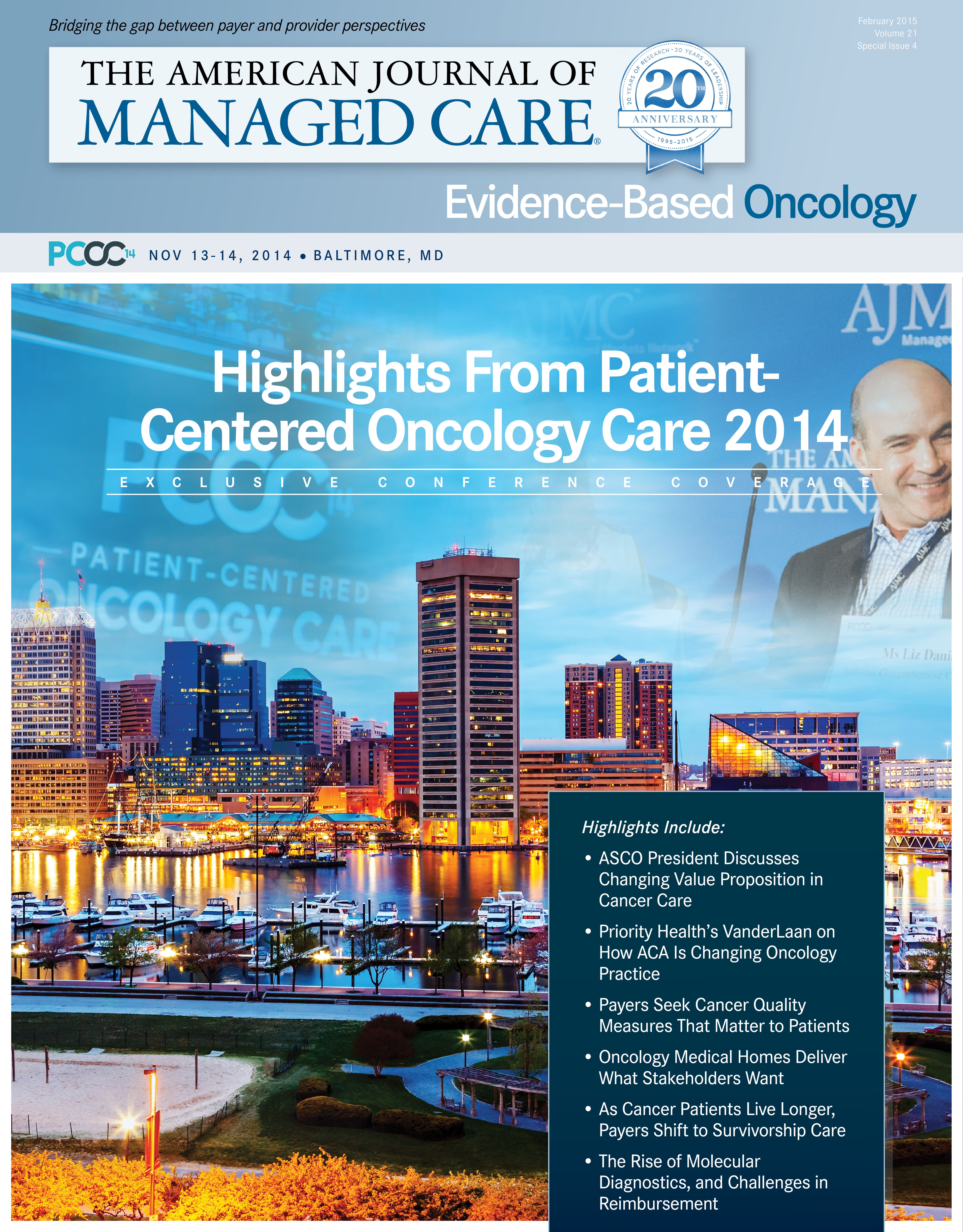- Center on Health Equity & Access
- Clinical
- Health Care Cost
- Health Care Delivery
- Insurance
- Policy
- Technology
- Value-Based Care
As Use of Diagnostics Rises, Challenges Remain in Education, Reimbursement
Increasingly, molecular diagnostic tests direct which therapy is best for cancer treatment or whether a therapy should even be used. This fact has raised a host of issues in cancer care: how do payers decide which tests they will cover? How can oncologists and genetic counselors involve patients in the testing process without overwhelming them? Most of all, how can physicians keep up with this fast-moving field, so that the promise of precision medicine moves beyond academic centers and into community practices?
Panelists led by moderator Ira M. Klein, MD, MBA, FACP, national medical director, Clinical Thought Leadership, Aetna, examined these questions in “The Road to Personalized Medicine: Clinical Utility and Reimbursement in Molecular Diagnostics,” an area in which regulators are racing to keep pace with developments in science. Panelists included Bruce Quinn, MD, PhD, MBA, a former Medicare official who is now senior health policy specialist for Foley Hoag, LLC; Rina Wolf, MHA, vice president for Commercialization Strategies with Xifin, a revenue cycle management company that supports about 70% of the molecular diagnostics claims in the United States; Howard L. Kaufman, MD, FACS, associate director for Clinical Sciences at Rutgers Cancer Institute of New Jersey; and Joy Larsen-Haidle, MS, CGC, president of the National Society of Genetic Counselors.
The promise of personalized medicine—the opportunity to tailor treatments to patients—has run headlong into cost concerns from payers, CMS chief among them, as diagnostics have become a major part of balance sheets in oncology care. Especially since 2011, payers have begun to demand not just proof of clinical validity—that is, evidence that a test showed what it said it would show—but also clinical utility, or proof that tests shape physician decision making and patient outcomes.
Klein referenced earlier speakers’ descriptions of how data that shape physician decisions don’t always get to the right place, or meet patient needs. How, he asked, can the field of molecular diagnostics fill some of these gaps, and what are the challenges? Wolf said cancer patients are most helped when there is a truly definitive diagnosis, and it is the predictive value of molecular testing that helps physicians decide on the best course of treatment. She said she had been surprised earlier in the conference to learn that 51% of patients were not receiving tests for EGFR mutations, “which is standard of care.”
Educating physicians, in addition to payers and regulators, so they stay abreast of scientific advances in molecular diagnostics and next-generation sequencing (NGS) is a huge challenge, Wolf said, and all stakeholders must work together on this. While the scientific community races ahead with NGS, Wolf said her firm still struggles with CMS and its contractors, in addition to commercial payers, just to get molecular diagnostic claims paid. Wolf and Quinn also discussed specific examples of bundling rules and other policies that work against patients by discouraging tests from happening in a timely manner. It would be better to take a public health approach in certain common cancers and test everyone who is diagnosed, Quinn said, rather than risk costly delays. “Turnaround times are a much bigger problem than people think,” he said.
At Rutgers, precision medicine is proving its value, Kaufman said, and that is making discussions with payers easier. “On complicated tumors and resistant cancers, we are doing full genomic sequencing and finding unexpected mutations, and there may be drugs available that target that specific mutation,” he said. In some cases, academic physicians must work with patients to include them in a clinical trial so they gain access to drugs that will work on those mutations. “We looked at the first 100 patients in the precision medicine program, and we changed the clinical treatment plan for 40% of the patients based on the diagnostic information that came in,” Kaufman said.
While he said Rutgers’ discussions with payers have been fruitful, he recognized that what gets approved in an academic center might not get approved in a community setting. Rutgers is now working to move its precision medicine model into community hospitals. “If it becomes more widespread, I am not sure what will happen,” Kaufman added.
Quinn is not surprised that payers want to see evidence before they are willing to offer reimbursement. He described instances in which early clinical results looked promising but time proved otherwise, so waiting for convincing evidence is prudent. But patients suffer, he and Wolf agreed, when Medicare policies discourage or delay testing, so there needs to be a better framework for who is tested and under what circumstances.
Larsen-Haidle said that genetic counselors are increasingly working side-by-side with oncologists to guide treatment. Counselors start the process by talking with patients about their family history, asking, “What are the odds there is a genetic component to the cancer you have developed?”It’s important for patients to be empowered and to understand what tests can and cannot tell them. “Most important,” Larsen-Haidle said, “how are they going to use it?” Tests also provide information for family members, “So for that same healthcare dollar, we have the opportunity to provide information for more people.”
Kaufman said that at Rutgers, he is sending more patients to genetic counselors to identify germline mutations that could affect other family members. Testing is becoming more mainstream.
“We have to balance what’s experimental and still needs to be done under the guise of a clinical trial, but we also have to push the field forward,” he said. Oncologists “have the ability to get this data now,” and should start using it.

Quality of Life: The Pending Outcome in Idiopathic Pulmonary Fibrosis
February 6th 2026Because evidence gaps in idiopathic pulmonary fibrosis research hinder demonstration of antifibrotic therapies’ impact on patient quality of life (QOL), integrating validated health-related QOL measures into trials is urgently needed.
Read More

